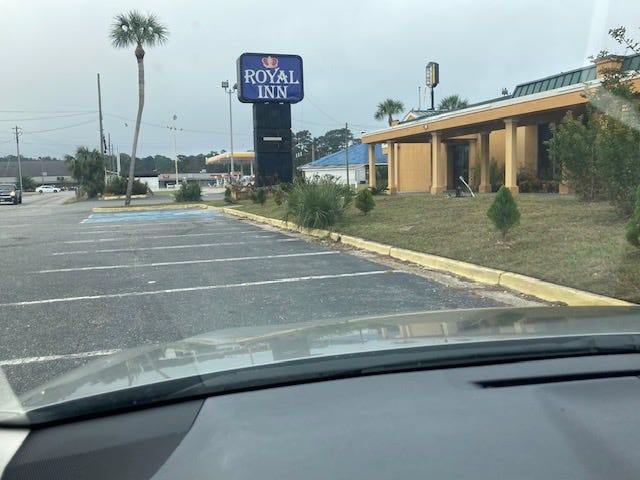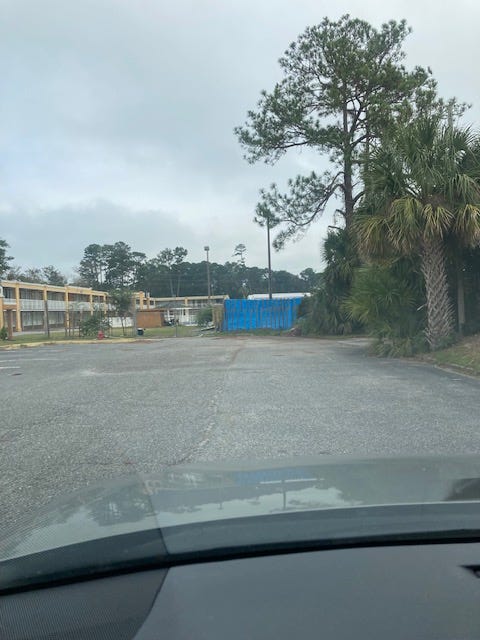Solving a 44-year-old mystery
Finding the wealthy travelers who disappeared in Brunswick, Georgia
They were traveling along the same highway—Interstate 95—that I drive on regularly from South Florida to North Carolina when they vanished 44 years ago. Charles and Catherine Romer had stopped for one night at the old Holiday Inn just off I-95, exit 36, after leaving a winter vacation in Miami for their home in Scarsdale, New York, in April 1980. I know the exit well; I often stay in a dog-friendly Wingate by Wyndham motel on the eastern side of the exit.
They must have been exhausted from the 400-mile drive. They called a son in New York to tell him they had arrived, then apparently went out for an early dinner, perhaps at a diner next door. Their plan seems to have been to return to the Holiday Inn, have a quiet drink, and retire for the evening before resuming their journey the next day. A bottle of Scotch and two glasses were still set out, untouched, when hotel workers came to clean the room the next day.
Their beds had not been slept in. They had yet unpacked their luggage, nor had they checked out. What happened during and after their meal remains a mystery, for they were never seen alive again. For decades, investigators have pondered the possibilities.
They were retired and quite well off. Were they kidnapped and murdered, possibly for the small fortune in jewelry Catherine Romer so proudly wore in public—some estimates as high as $100,000? Did opportunists attack them, steal their late-model Lincoln Continental and bury the bodies, perhaps in one of many lakes and ponds alongside or near the Interstate? Did it start at the Holiday Inn, or perhaps at the restaurant next door?
It was a cold case, one I had never heard about. I was preparing to drive home to my sister’s house in Raleigh, North Carolina, for the recent Thanksgiving holiday, when she happened to see a sudden news report, datelined Brunswick, and passed it on. My old journalist’s ears pricked up: investigators had detected a car believed to be the Romers’ at the bottom of a murky retention pond, scarcely a stone’s throw across the Interstate from where I planned to break my trip in half. The pond was being drained, after divers found a human bone in the car …
Film at 11.
* * * * * *
The journalist in me wanted to hang around and write the whole story … but since the story has now made the national news, so you will get only my synopsis here.
The Holiday Inn structure still exists, ‘tho restyled and rebranded in the 1980s as a budget knockoff now called the Royal Inn. I had tried a number of similar “cheap” dog-friendly motels catering to tourist at the exits around Brunswick—the Royal was not among those listed on my favorite website, BringFido.com—before settling on my latest current choice, which serves my needs fairly well.
The sign of the Royal Inn, near Brunswick, Georgia. Author’s photo
My traveling companion, a 14-year-old poodle named Benji, seems to like it better than the last one we used—at another exit. If the Wingate is a bit more expensive than I would prefer (I am a notoriously thrifty traveler!), it does have more amenities, including a hot breakfast bar and restaurants nearby, and tends to attract families with friendlier dogs. All in all, a win-win for both of us.
My wife Margaret and I moved from Northern Virginia to Pembroke Pines, Florida, in 2021. At that time, I still owned my childhood home in Dunn, North Carolina, on I-95 near Fayetteville, and continued using it as a sort of writer’s retreat, making the trek every 3-4 months, until it was sold in July. Brunwick is almost exactly halfway to Dunn, just over the Georgia-Florida line, a perfect stopping point.
The 800-mile trip takes at least two days. Because Benji and I usually pull in just after sunset, I decided to wait until the next morning before I started sleuthing last week. Always easier to see the full picture in daylight, I remembered from my long-ago days as a newspaper reporter. I did not expect to find out much; I knew the site was already closed off to the public, and the local television reports gave me an idea of the slow progress being made.
But I was insatiably curious. I had to see what I could. So after we packed up the car and prepared to continue our way north, on the second 400-mile segment of our trip, Benji and I wound our way slowly around the Royal Inn’s parking lot, and then around the adjacent Mulligan’s Bar and Roadhouse (another recent incarnation from appearances). There were no cars parked in either lot at 10 a.m., and frankly, the Royal Inn looked closed, its pool unused—I wondered whether it had been closed down until the investigation was completed, or if it was perhaps on the verge of renovation?
The large pond, about 12-15 feet deep and 100 feet long, was constructed to take and hold rain runoff from the highway and surrounding areas. Draining it was time consuming. As I found out later, even towing the car out proved problematic—it was beginning to disintegrate after 44 years underwater—and it took some ingenious steps to keep it from falling apart completely.
The front door of the Royal Inn, near Brunswick, Georgia. Pool visible at far right. Author’s photo
The retention pond was located within a few yards of the motel swimming pool. When I saw it, there was a temporary chain-link fence around the pond, with blue tarpaulins inside, blocking the view. A Glynn County sheriff’s car was parked outside the entrance, and I did not think it wise to come too close.
Fence around retention pond outside the Royal Inn. Sheriff’s vehicle obscured beyond the tree at right. Author’s photo
From inside my car, I could see the entrance to the pond, open at the end of the fence nearest the highway, but hesitated to get any closer. Reporters had not been allowed inside the fence on TV, and I suspected I would not be given access if I asked—as a gawking tourist—so I did not push the issue.
The pond as seen from Royal Inn, before larger fence was installed. Romers’ car visible at right end of pond. News photo
News reports speculated that the car may have backed accidentally into the retention pond from a parking space near the restaurant—possibly after the driver suffered a heart attack—since it was facing forward when finally pulled from the pond. So far, there is no evidence of who was driving. Other reports described the customized Lincoln Continental, just a year old when it went underwater, was so badly damaged by rust and corrosion that it began coming apart as it was being towed, with the rear axle completely separated from the rest of the vehicle.
The skeletal remains of both victims were apparently discovered inside the submerged vehicle, indicating that neither may have been able to escape after the car sank. Belongings found in the vehicle—including Catherine Romer’s jewelry—were so fragile that they began disintegrating when exposed to air and touched, according to one report. Positive identification of the bones will require weeks or months of testing, experts said.
A longtime employee of the old Holiday Inn recalled that divers did attempt to search the retention pond shortly after the Romers’ disappearance, along with many other ponds and lakes in the region. But other reports indicated that the pond’s water was so dark that visibility was severely limited, and the deep pond was never drained—until now.
Undated photo of the Romers. Courtesy themirror.com
In the years and decades to come, investigators had contiued to pursue the case periodically, searching dozens of sites without success.But a persistent South Carolina “cold case” enthusiast eventually solved the case with his homemade floating sonar detector. Jason Souhrada of Myrtle Beach, South Carolina, took an interest in the Romer case, and “captured images from his sonar system which he says showed a car. He then alerted the [nonprofit] Sunshine State Sonar Team to dive the pond,” according to WTOC television reports. His discovery soon drew involvement by law enforcement.
Jason Souhrada’s floating sonar detector. Courtesy WTOC 11 News
The Romers, longtime friends who had each been widowed, had been married only a few years when they vanished. Charles Romer, a retired oil company executive, was 73, Catherine 75. Their three sons have since died, with only grandchildren left now to mourn them. But the grandchildren were grateful for the closure they had always hoped for, issuing a joint statement of gratitude:
“We are deeply saddened and equally relieved that our grandparents Charles and Catherine Romer’s 44-year mystery disappearance has been solved. While this discovery brings closure, it still has been very emotional. Sadly, Charles Romer Jr., Jim Romer and Frank Heller are not with us to share this momentous turn of events and to know their parents will finally be laid to rest in peace. We want to express our gratitude to Glynn County Police, the Georgia Bureau of Investigation and Sunshine State Sonar for their time dedication and expertise. A special appreciation and thanks goes out to Jason Souhrada of Myrtle Beach, SC. Jason pinpointed the exact location of the vehicle and shared his findings with all the agencies involved.”
I feel as if I got to know the Romers very quickly, that they were now fast friends. It was a sad but somehow fitting ending to an old mystery.
Next time: Foreign affairs in a crazy mixed-up world







